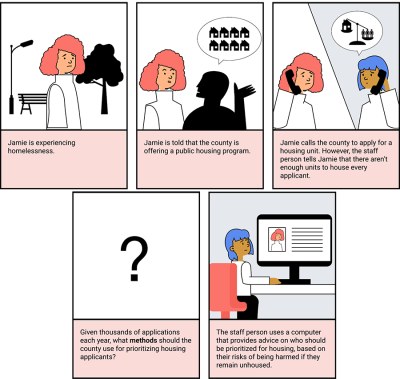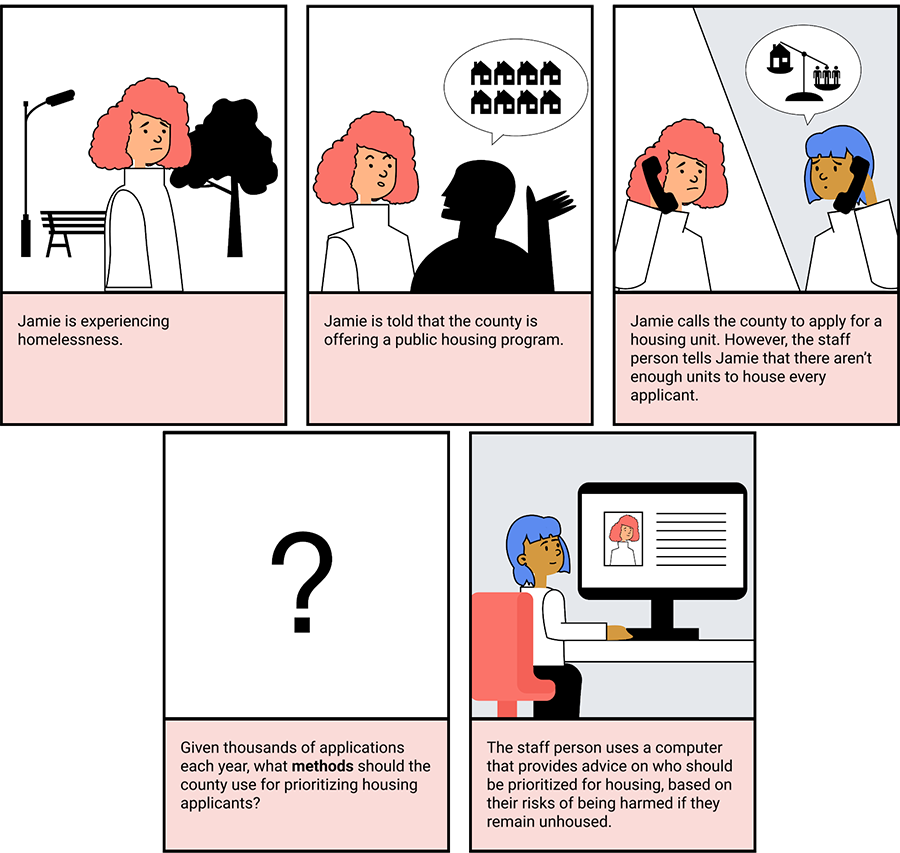Related People
Tzu-Sheng Kuo, Ken Holstein, Jason Hong, Hong Shen, Haiyi Zhu
CMU Researchers Use Comics To Explain AI-Supported Public Housing System to People Who Need It Most


As artificial intelligence becomes more accessible and prevalent in everyday life, the humans who use it should still be central to its implementation, even if they don't have a technical background. Researchers in Carnegie Mellon University's School of Computer Science used comics to explore how community-centered AI design can include both the people experiencing homelessness and the frontline workers who use AI to help them.
"AI systems are now deployed everywhere, including in public services," said Tzu-Sheng Kuo, a Ph.D. student in the university's Human-Computer Interaction Institute (HCII). "Often, the stakeholders and community members who are not necessarily technical experts are not involved in the conversation around designing and deploying the system, but it is important to incorporate their feedback with appropriate scaffolding."
The comics, which look like a film storyboard with a caption under each panel, depict the steps someone would take when interacting with the public housing system and the AI software it uses. For example, in one panel the main character calls the county to apply for housing, then another panel shows a county worker using the AI software.
The team used a gender-neutral main character to allow people to relate to or distance themselves from the information in the comics as necessary. Throughout the process, the researchers learned about the challenges that frontline workers and members of the unhoused community face in understanding how AI-based housing allocation systems work.
Researchers found that people not only want to have input after the system is in place, but they also want to be part of the design and its usage.
"We first need to identify the real needs of community members and whether an algorithm can be beneficial in each space," Kuo said.
The team's paper, "Understanding Frontline Workers' and Unhoused Individuals' Perspectives on AI Used in Homeless Services," won a Best Paper award from the ACM CHI Conference on Human Factors in Computing Systems (CHI 2023), held last month in Hamburg, Germany.
As part of the comicboarding process, the team worked with experts in public housing and homelessness programs and discussed barriers they face, including the social stigma around homelessness, low reading literacy and lack of AI education, and an imbalance in power dynamics. Understanding these challenges made the final design of the comics more effective.
"When you're working with real-world marginalized communities, you need to be careful that you're not harming them further," said Hong Shen, an assistant research professor in the HCII, who notes that this approach also helped build trust between the researchers and the participants. "We designed this comic with the community and for the community, treating them as our partners and sharing leadership."
Some workers recounted supervisors telling them they shouldn't "ask what's in the sausage" when it comes to how the AI-based housing system works. But Kuo notes that past research shows plenty of drawbacks to a lack of transparency.
"Lots of the developers mention that these models should be kept hidden from frontline workers, so they don't game or reverse-engineer the system," he said. "We believe that if the system can be gamed, then it is most likely not properly designed in the first place."
The team members — including HCII faculty members Jason Hong, Ken Holstein and Haiyi Zhu; and Nev Jones, an assistant professor in the School of Social Work at the University of Pittsburgh — each contributed a diverse perspective on computer science to the project. CMU and the environment the university creates allow for that to happen, Shen said.
"We are uniquely positioned to do this type of work — trying to bridge the gap between the technical and social and the gap between researchers and impacted communities," Shen said,
The work was sponsored by the National Science Foundation, Smart and Connected Communities program and Human-Centered Computing program.
By Stacey Federoff
For More Information
Aaron Aupperlee | 412-268-9068 | aaupperlee@cmu.edu
Research Areas

